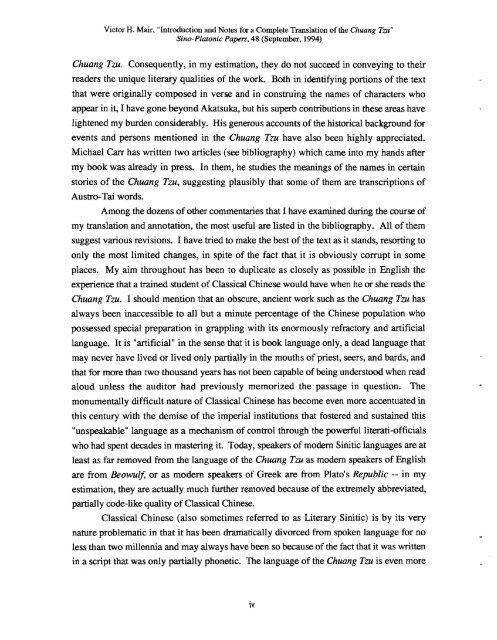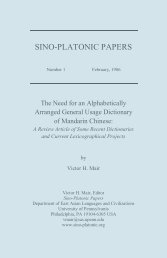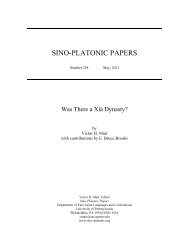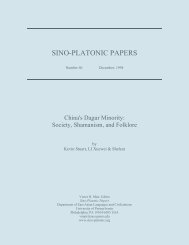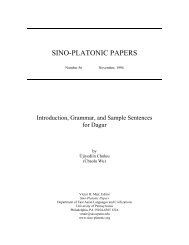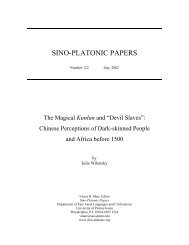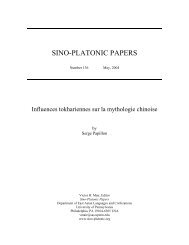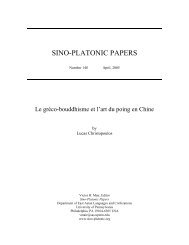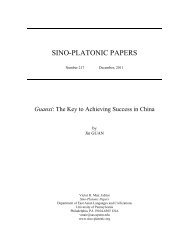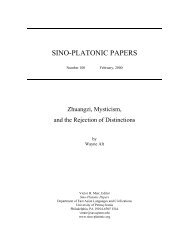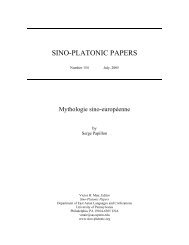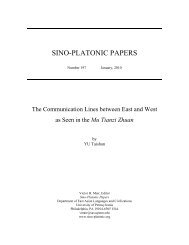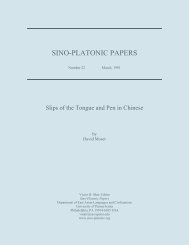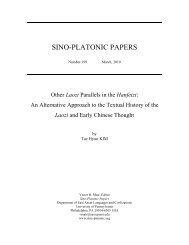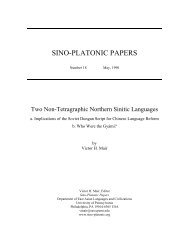Introduction and Notes for a Complete Translation of the Chuang Tzu
Introduction and Notes for a Complete Translation of the Chuang Tzu
Introduction and Notes for a Complete Translation of the Chuang Tzu
You also want an ePaper? Increase the reach of your titles
YUMPU automatically turns print PDFs into web optimized ePapers that Google loves.
Victor H. Mair, "<strong>Introduction</strong> <strong>and</strong> <strong>Notes</strong> <strong>for</strong> a <strong>Complete</strong> <strong>Translation</strong> <strong>of</strong> <strong>the</strong> Clzuang T ."<br />
Sino-Platonic Papers, 48 (September, 1994)<br />
<strong>Chuang</strong> Tm. Consequently, in my estimation, <strong>the</strong>y do not succeed in conveying to <strong>the</strong>ir<br />
readers <strong>the</strong> unique literary qualities <strong>of</strong> <strong>the</strong> work. Both in identifying portions <strong>of</strong> <strong>the</strong> text<br />
that were originally composed in verse <strong>and</strong> in construing <strong>the</strong> names <strong>of</strong> characters who<br />
appear in it, I have gone beyond Akatsuka, but his superb contributions in <strong>the</strong>se areas have<br />
lightened my burden considerably. His generous accounts <strong>of</strong> <strong>the</strong> historical background <strong>for</strong><br />
events <strong>and</strong> persons mentioned in <strong>the</strong> <strong>Chuang</strong> Tm have also been highly appreciated.<br />
Michael Carr has written two articles (see bibliography) which came into my h<strong>and</strong>s after<br />
my book was already in press. In <strong>the</strong>m, he studies <strong>the</strong> meanings <strong>of</strong> <strong>the</strong> names in certain<br />
stories <strong>of</strong> <strong>the</strong> <strong>Chuang</strong> <strong>Tzu</strong>, suggesting plausibly that some <strong>of</strong> <strong>the</strong>m are transcriptions <strong>of</strong><br />
Austro-Tai words.<br />
Among <strong>the</strong> dozens <strong>of</strong> o<strong>the</strong>r commentaries that I have examined during <strong>the</strong> course <strong>of</strong><br />
my translation <strong>and</strong> annotation, <strong>the</strong> most useful are listed in <strong>the</strong> bibliography. All <strong>of</strong> <strong>the</strong>m<br />
suggest various revisions. I have tried to make <strong>the</strong> best <strong>of</strong> <strong>the</strong> text as it st<strong>and</strong>s, resorting to<br />
only <strong>the</strong> most limited changes, in spite <strong>of</strong> <strong>the</strong> fact that it is obviously corrupt in some<br />
places. My aim throughout has been to duplicate as closely as possible in English <strong>the</strong><br />
experience that a trained student <strong>of</strong> Classical Chinese would have when he or she reads <strong>the</strong><br />
<strong>Chuang</strong> <strong>Tzu</strong>. I should mention that an obscure, ancient work such as <strong>the</strong> Chwng <strong>Tzu</strong> has<br />
always been inaccessible to all but a minute percentage <strong>of</strong> <strong>the</strong> Chinese population who<br />
possessed special preparation in grappling with its enormously refractory <strong>and</strong> artificial<br />
language. It is "artificial" in <strong>the</strong> sense that it is book language only, a dead language that<br />
may never have lived or lived only partially in <strong>the</strong> mouths <strong>of</strong> priest, seers, <strong>and</strong> bards, <strong>and</strong><br />
that <strong>for</strong> more than two thous<strong>and</strong> years has not been capable <strong>of</strong> being understood when read<br />
aloud unless <strong>the</strong> auditor had previously memorized <strong>the</strong> passage in question. The<br />
monumentally difficult nature <strong>of</strong> Classical Chinese has become even more accentuated in<br />
this century with <strong>the</strong> demise <strong>of</strong> <strong>the</strong> imperial institutions that fostered <strong>and</strong> sustained this<br />
"unspeakable" language as a mechanism <strong>of</strong> control through <strong>the</strong> powerful literati-<strong>of</strong>ficials<br />
who had spent decades in mastering it. Today, speakers <strong>of</strong> modern Sinitic languages are at<br />
least as far removed from <strong>the</strong> language <strong>of</strong> <strong>the</strong> <strong>Chuang</strong> Tm as modem speakers <strong>of</strong> English<br />
are from Beowulf, or as modem speakers <strong>of</strong> Greek are from Plato's Republic -- in my<br />
estimation, <strong>the</strong>y are actually much fur<strong>the</strong>r removed because <strong>of</strong> <strong>the</strong> extremely abbreviated,<br />
partially code-like quality <strong>of</strong> Classical Chinese.<br />
Classical Chinese (also sometimes referred to as Literary Sinitic) is by its very<br />
nature problematic in that it has been dramatically divorced from spoken language <strong>for</strong> no<br />
less than two millennia <strong>and</strong> may always have been so because <strong>of</strong> <strong>the</strong> fact that it was written<br />
in a script that was only partially phonetic. The language <strong>of</strong> <strong>the</strong> <strong>Chuang</strong> <strong>Tzu</strong> is even more


